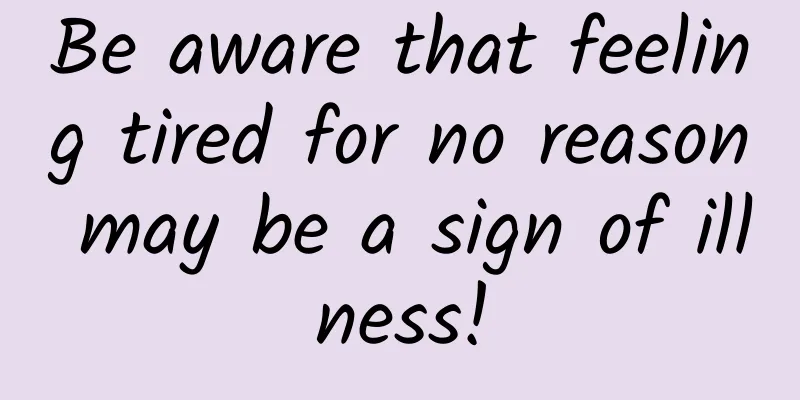Be aware that feeling tired for no reason may be a sign of illness!

|
Some people are full of energy every day, while others can't help but feel tired all the time. The saying "spring fatigue and autumn exhaustion" can easily make people ignore the real cause of fatigue. Always feeling tired is a sign of illness. Find the cause and treat it accordingly to regain your energy as soon as possible. Hypothyroidism General fatigue, easy drowsiness, poor spirits, feeling tired. Modern people will experience these symptoms from time to time, but it is not because of poor sleep. Be alert that there may be problems with the thyroid gland. If you have the following ten symptoms, it is recommended to go to the hospital immediately: Feeling sleepy easily, lacking physical strength and energy; Slow thinking, difficulty concentrating, and memory loss; Weight gain, dry skin; Nails become brittle and break easily; Often feel cold; Feelings of low mood and depression; Prone to constipation; Feeling stiffness and pain in muscles and bones, and numbness in hands; Increased blood pressure or a slower heartbeat; Increased cholesterol levels. Mild hypothyroidism generally does not require special treatment, and dietary therapy and appropriate consumption of seafood are sufficient. Moderate to severe hypothyroidism requires thyroid hormone replacement therapy. The specific dosage varies from person to person. Elderly patients do not require too much supplementation, as long as the high-sensitivity thyrotropin is controlled within normal levels. Hypothyroidism is generally irreversible and requires lifelong replacement therapy. Sleep apnea If you still feel tired after waking up, or even sleepy, you should check whether you snore at night. Long-term snoring will first affect the quality of sleep, and will also affect blood pressure and heart rate over time. Don’t be overly alarmed if you have short-term snoring. Most cases will disappear after you get enough rest and the cold is relieved. When the following characteristics appear, it may be sleep apnea syndrome, which requires timely treatment to relieve drowsiness and fatigue, such as uneven snoring and paroxysmal apnea. There is impairment of daytime function, such as dry mouth in the morning, drowsiness, fatigue, lack of concentration, memory loss and other symptoms. In addition, if there is impairment of daytime mood, such as irritability, irritability, depression, anxiety and other symptoms, it should also be paid attention to. Children's snoring may cause bedwetting and other symptoms when they grow up. Postprandial hypotension I have to sleep for a while after breakfast every day. After lunch, I feel dizzy and weak all over. I want to sleep very much and I feel unsteady when walking. If this happens for a long time, it is a "warning signal" of low blood pressure sent by the body to us. The standard for postprandial hypotension is that the systolic blood pressure (high blood pressure) drops by ≥20 mmHg within 2 hours after a meal; or the systolic blood pressure (high blood pressure) is 100 mmHg or higher before a meal and drops to below 90 mmHg after a meal; sometimes, even if the blood pressure drop does not meet the standard, but the patient has hypotensive reactions such as dizziness, fatigue, drowsiness, or even syncope, it is also considered postprandial hypotension. Postprandial hypotension is more common in elderly people with illnesses, such as those who already suffer from hypertension, diabetes, etc. The incidence of postprandial hypotension is highest after breakfast, followed by lunch and dinner. The occurrence of postprandial hypotension is related to cardiovascular and cerebrovascular arteriosclerosis, decreased heart function, and decreased blood pressure regulation mechanisms in the elderly. To prevent postprandial hypotension, you can communicate more with your attending physician and adjust the time of taking antihypertensive drugs and monitor blood pressure in a timely manner according to the specific situation. diabetes Can't lift your spirits and always feel drowsy... Relatively speaking, diabetic patients are more likely to experience fatigue symptoms. The causes of fatigue in different diabetic patients are different, and symptomatic treatment can effectively relieve fatigue. There are four reasons why diabetic patients experience fatigue: Insulin deficiency or resistance, potassium ion loss, and complications can all cause fatigue. To relieve fatigue caused by diabetes, you should first control your blood sugar. When patients suddenly experience worsening fatigue, they should pay attention to whether hypoglycemia has occurred. Appropriate exercise can increase insulin sensitivity in diabetic patients and improve fatigue. Patients who take metformin for a long time are prone to vitamin B12 deficiency, which can also easily cause fatigue in patients. Attention should be paid to the supplement of vitamin B12 during medication. At the same time, the TCM methods of "replenishing qi and nourishing yin", "clearing heat and moistening dryness", "tonifying the kidney and strengthening the spleen" and other methods can be used to treat the patient's fatigue symptoms through syndrome differentiation and treatment or diet therapy. Cancer-related fatigue Nearly 70% of cancer patients will experience persistent fatigue symptoms, which makes them very painful. In fact, this is what is commonly referred to as cancer-related fatigue in clinical practice. Fatigue should be treated positively, just like cancer. Cancer-related fatigue is different from other fatigue. This kind of fatigue is not proportional to recent physical exertion. Even if you don’t work and rest every day, you still feel lack of energy, and this kind of fatigue cannot be relieved by rest and sleep. The mechanism of cancer-related fatigue is quite complex, and patients need to treat it seriously as a "complication" of cancer. Appropriate physical exercise should be maintained. Ask the doctor to comprehensively evaluate the nutritional status and formulate a nutritional support plan; complications such as pain, anemia and sleep disorders can cause fatigue, which can be appropriately relieved through medication. It is also very important for patients to overcome cancer fatigue and improve their mood. External treatment methods in traditional Chinese medicine, such as acupuncture, moxibustion, and fire needles, can also quickly and effectively improve cancer-related fatigue. No reason, test for chronic fatigue syndrome Always feeling tired is a disease in itself, called chronic fatigue syndrome, which needs to be taken seriously. If 4 or more of the following symptoms occur at the same time and these symptoms have persisted or recurred for 6 months or longer, you should go to the hospital as soon as possible to see a doctor to see if you have chronic fatigue syndrome. Short-term memory loss or difficulty concentrating; Sore throat Swollen, painful lymph nodes in the neck or underarms; Muscle aches and pains Multiple joint pain without redness or swelling; Headache, but the type, pattern, and severity of the headache are different from before; Energy cannot be restored after sleep; fatigue lasts for more than 24 hours after physical or mental work. |
Recommend
After watching 1,000 videos, we summarized 10 ways to make money on Douyin!
In the past two days, I have watched more than 1,...
Tutorial on how to flirt with girls, how to learn pua emotional manipulation? Baidu Cloud Download
Tutorial on how to flirt with girls, how to learn...
YouTube reveals: 5-second ads earn more than 120-second ads
Last weekend, I opened an app and was about to wa...
Digital progress bar
Source code introduction: Customize the digital p...
A look at some of the weirdest scientific research in 2022
In 2022, the serious scientific community brought...
Advertising placement: A look at some of the public algorithms of various media from an operational perspective
The media’s algorithm is a black core. We don’t k...
What's so strange about hanging a person? Your hair is much stronger than an elephant's hair.
Key Points ★ Theoretically, a head of hair is eno...
Marketing and promotion activities tips for training institutions!
Double Eleven has just passed, and Double Twelve ...
Can people speak without vocal cords? A new AI-assisted pronunciation system is born!
With the help of artificial intelligence (AI), a ...
Get to know an insect every day: Hemispheric shield bug, Wang's notched green moth...
"Learn an insect every day" knowledge s...
User growth ≠ fission and new user acquisition!
Fission and attracting new users should not be th...
Getting Started Guide for Massive Streaming
Juleliang Qianchuan was fully launched on April 9...
Before the end of the year, remember to go to the Apple Store to replace your iPhone's battery
Affected by last year's iPhone throttling sca...
Dislocated joints due to yawning, broken bones due to going to toilet, why are contemporary college students so "fragile"?
Audit expert: Wu Xinsheng Deputy Chief Physician ...
I run to the toilet as soon as I drink coffee. Who can tell the difference between coffee and enema?
What is your main reason for drinking coffee? Is ...









